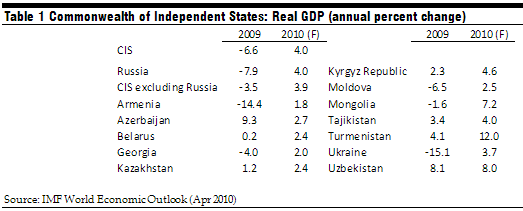Click here to view the Russian language version of this article.
Everyone around the world breathed a sigh of relief when 2009 finally bowed out. It has been a pretty poor year with developers going bankrupt and banks assuming control of unfinished and unwanted projects. As we enter the second half of 2010, the outlook for many developing countries of CIS is more positive. Table 1 shows GDP growth rates for the CIS countries. Investors now looking to get back into the markets will no doubt be cautious, and will insist on more scrupulous reviews and due-diligence before committing their money to a project.
Hotel investments are very different from other forms of real estate. A residential project will generate cash right away from sale of the apartments. But once the units are sold, the owner can never profit from any potential price increases in the future. Retail and Commercial space is rented out for a long period of time, which makes it inflexible in relation to inflation variations and potential rate increases. Hotels are different from all the above in the sense of its product being sold on a daily basis. This allows hotels to react immediately to changes in demand-supply dynamics. Over a given period of time a hotel can offer higher rate of return compared to other real estate projects. Even though hotels are profitable projects, it takes a great deal of expertise to manage them not only in times of crisis but also in times of economic boom. Experienced consultants and management companies will help the potential owner maximize the returns on a hotel investment.
When investing in a proposed hotel project, due diligence plays an increasingly important role. Feasibility reports are provided by consulting companies for the following purposes:
- Determining highest and best use of a particular plot of land;
- Determining Return On Investment (ROI) for a prospective developer;
- Assisting a developer in raising debt or attracting equity participation;
- Obtaining a franchise or management contract.
Historically feasibility reports have been prepared by either accounting firms or real estate consulting companies and are market studies with financial projections. While they will allow the investor to understand expected cash flows, they will traditionally not address the concept of financial feasibility. A feasibility report produced by a specialized hospitality consultant should cover the following aspects:
- Assess historic, present and future demand and supply of hotel accommodation;
- Consider the demand for other hotel facilities, such as meeting areas, restaurants, bars and recreational facilities and recommend the optimal development strategy;
- Review and suggest the appropriate brand strategy for the subject site;
- Estimate the likely operating income and expenses for ten years following the opening of the hotel.
The study must evaluate the local area by analyzing the economics of the city or the region and conclude whether the proposed site is suitable for hotel development. It must also look at the local competitive market with regard to existing and proposed demand for hotel accommodation. The study should also determine which market segments are likely to experience growth. The analysis of historical supply and demand also gives an insight into the current stage in the cycle of hotel development, giving the promoter an opinion on whether there is likely to be favorable or unfavorable changes in the local hotel market.
The feasibility should also recommend appropriate facilities, highlighting the number of guestrooms that the market can sustain with an indication of the number of F&B outlets, meeting space, retail space, recreational and parking facilities that should be developed. While the feasibility study may highlight existing facilities in comparable hotels within the local market, it should also comment upon the facilities that are not available and are required by the current market and what may be required in the future. The competitive positioning of the subject hotel in relation to the market should also be assessed. The entire process of hotel development can take a number of years, so developers have to be careful that they don’t build a hotel which is suitable for "yesterday's" market.
A more complete feasibility study should include an IRR (Internal Rate of Return) calculation, which clarifies to the developer whether the project is financially feasible or not. Another aspect that should be considered is the impact of branding a hotel. Depending on the type and location of the development, branding can significantly enhance the revenue of the hotel. Therefore, selecting the appropriate brand is very important. The feasibility study may conclude that the market and site are suited for a good 4 star development, instead of a budget or luxury hotel.
We hope that this article will help to understand some of the points that need to be considered when making a hotel investment. We have touched upon several different topics in this article, such as feasibility reports, risks associated with hotels, sale of hotels and others. There will be more articles to come that will cover these issues separately and explain them in greater detail.
For more information, questions and comments please contact Alexey Korobkin at akorobkin@hvs.com.


Alexey - great first article, and on a market that you are quickly becoming an expert on. Great job!!!
I have a plan related to hotel business and I want to do a feasibility study on the same Idea. I also have an Investor. Please get back to me if you provide such services